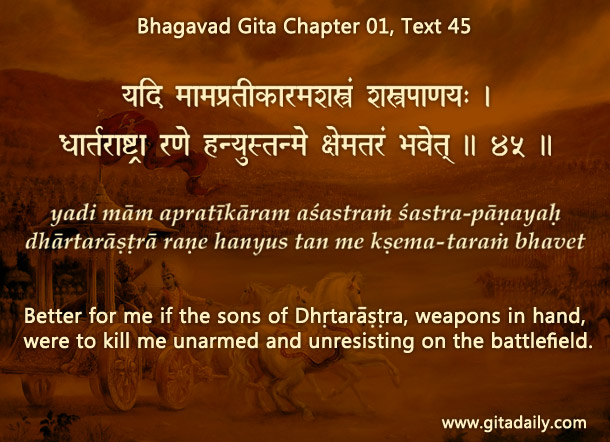The Bhagavad-gita’s first chapter describes its setting: a battlefield where two huge armies were assembled, ready to fight. Wars are graphic examples of emergency situations that require urgent action.
Amid emergencies, we need to act not just immediately, but also intelligently — that is, act in ways that make things better, not worse. In some emergencies, what will make things better is clear: when a fire breaks out, we need to find something to extinguish it. But we live in a complex world which sometimes confronts us with emergencies that can’t be addressed by any obvious measures. Or worse still, the obvious measures may well end up making things worse, not better. Suppose a severely sick person is brought before a doctor. The doctor will naturally want to treat that person, but suppose the patient’s sickness eludes the doctor’s diagnosis: then they need to consult a more experienced doctor. Or suppose the diagnosis seems straightforward initially, but soon the patient starts exhibiting symptoms contrary to the diagnosis: that too should give the doctor cause to pause.
In the Gita’s first chapter, Arjuna gets a similar cause for pause. The sheer scale of the impending destruction in the fratricidal war changes his response from fighting to freezing (01.45); he is too heroic to even consider the third typical response: fleeing. But soon the same thoughtfulness that has rendered him physically inactive makes him philosophically receptive — he seeks an answer to one of life’s big questions: what is the right thing to do? (02.07) His readiness to patiently and attentively hear a philosophical answer on a battlefield can inspire us to be similarly contemplative whenever necessary, even amid emergency situations.
One-sentence summary:
The Gita’s battlefield setting demonstrates that we shouldn’t let any situation, however urgent, steal our right to thoughtful decision-making.
Think it over:
- What are the three typical responses to urgent situations?
- What does the Gita’s first chapter teach about dealing with emergencies?
- Consider a past emergency that you responded to impulsively. How might taking the time to turn to the Gita and think have helped you to respond better?
***
01.45: Better for me if the sons of Dhritarashtra, weapons in hand, were to kill me unarmed and unresisting on the battlefield.
To know more about this verse, please click on the image


Leave A Comment